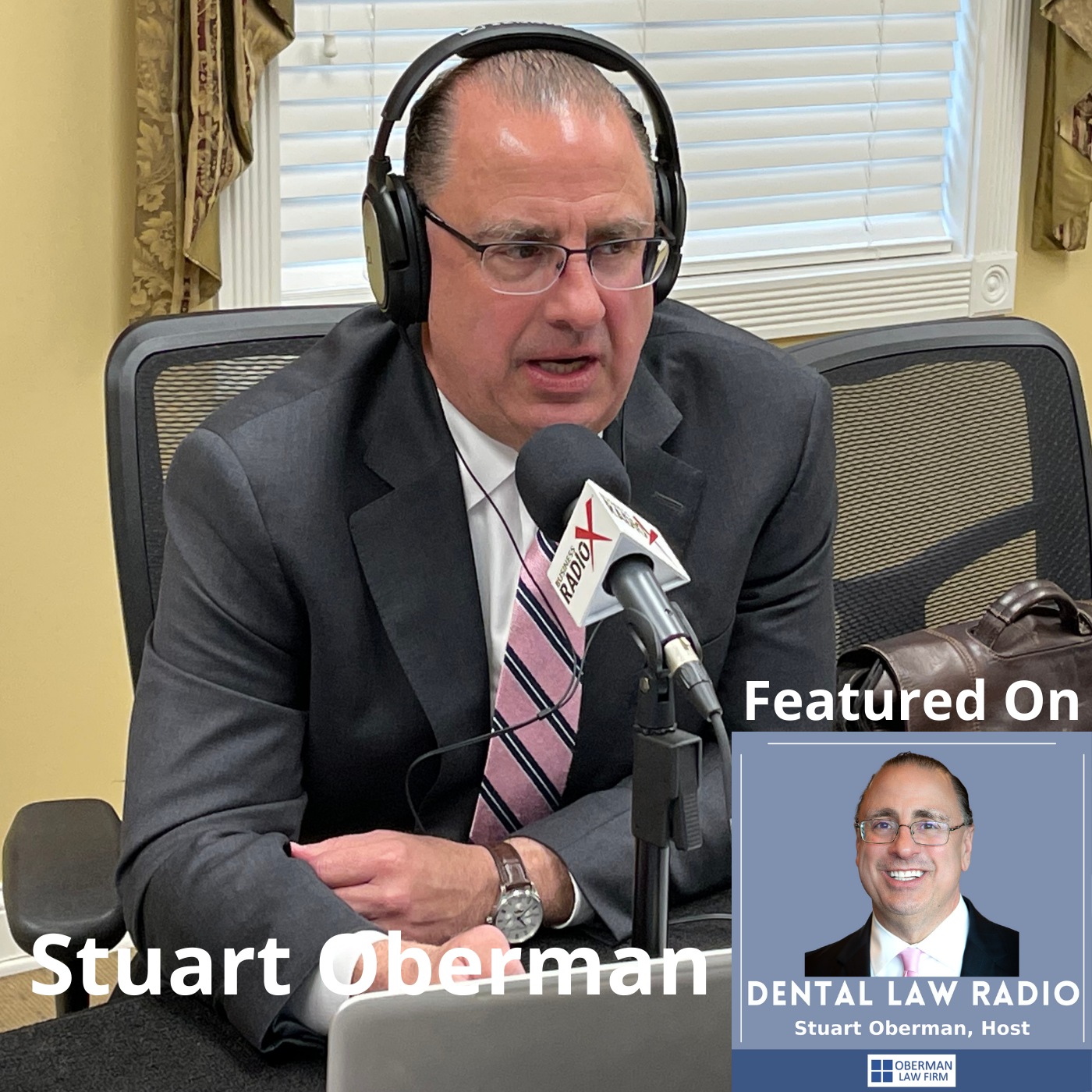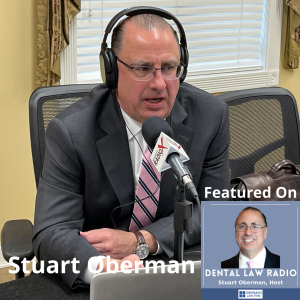
Whistleblower Employees (Dental Law Radio, Episode 3)
On this edition of Dental Law Radio, Stuart Oberman discussed problem employees who file complaints with OSHA and HIPAA, the preemptive actions a practice owner should take, how to handle the situation once a complaint has been filed, and much more. Dental Law Radio is underwritten and presented by Oberman Law Firm and produced by the North Fulton studio of Business RadioX®.
TRANSCRIPT
Intro: [00:00:02] Broadcasting from the Business RadioX Studios in Atlanta, it’s time for Dental Law Radio. Dental Law Radio is brought to you by Oberman Law Firm, a leading dental-centric law firm serving dental clients on a local, regional, and national basis. Now, here’s your host, Stuart Oberman.
Stuart Oberman: [00:00:27] Hello, everyone. And welcome to Dental Law Radio. We’re going to cover two topics today that really have surfaced in the last couple of months. For the last couple of years, they really have been, I would say, on the rise. But with COVID-19, as I said before in previous podcasts, I don’t necessarily harp on COVID-19, so I think we’re ready to come out of that particular scenario – there’s a lot of lessons learned. And I think that that particular period of time, which is still ongoing, has really taught our doctors a lot of lessons.
Stuart Oberman: [00:01:06] So, one of the things that we’ve really, really want to harp on today is compliance and employees. You know, I’ve said before that the patients are easy. The employees can be very problematic at times. And I’ve heard a saying from one of our employees, practice of dentistry would be a fantastic career. But, again, those are different things that we want to take a look at. So, what are we talking about today? What’s on the topic today? What’s hot? What are we developing? OSHA and HIPAA whistleblower.
Stuart Oberman: [00:01:38] So, I’ve been talking about this for a while on the road, you know, before all this. But what’s happened is that, as I said before in a previous podcast, problem employees are going three places, OSHA, HIPAA, Department of Labor, State and Federal. So, your problem employees are going to file complaints with OSHA and HIPAA. The question is, how do you deal with that? What do you do when you get that nasty letter that says you have committed a whistleblower violation, or an OSHA violation, or HIPAA violation? So, how do you get to an OSHA whistleblower? And what in the world is a whistleblower?
Stuart Oberman: [00:02:24] So, we think a whistleblower, we think massive corporations, you know, the guys in the internal side that are complaining to the government that this is not correct, this is not correct, over expenditures here, this is wrong, this is wrong, compliance issues, violations of the law. But, really, in our dental practices, it’s simply employees who complain for whatever reason. A lot of it is disgruntled employees who are not happy with their pay, their circumstances, and they’re going to get even, and they’re going to file a complaint with OSHA or HIPAA for whatever reason.
Stuart Oberman: [00:02:59] So, the question is, you get these letters – as we talked about on a previous podcast, you have a system in place. And if not, you need to get one very quickly on how to respond to this. So, what happens is, you get this letter from either OSHA or HIPAA. You got a certain time period to respond. You have certain things that you need to do. And you’re going to know – depending on how big your practice is – right away who did it. Who complained to the government, you’re going to know. If not, you’re going to find out very quickly.
Stuart Oberman: [00:03:32] Of course, what’s going to happen is you’re going to be absolutely livid at that employee for filing a complaint against you when you’ve taken care of that employee, you give them all the raises. But for some reason, you got a complaint. Now, you’ve got to deal with it.
Stuart Oberman: [00:03:49] So, provided you have a process in place, you will respond to it. Hopefully, you will get counsel to do that, and not have your consultant do it or have a staff member do it. But you’ll get outside professional counsel to do it on the legal side that understands how to do it.
Stuart Oberman: [00:04:06] So, you will work that investigation. And the question is, you are absolutely livid to this employee who filed this complaint. And you’re going to get even. Bad thing to do. Bad thing to do. Wrong thing to do. Detrimental thing to do. So, under federal rules, the whistleblower statute, you cannot retaliate against an employee. So, what does that mean? That means you can’t fire them. You can’t demote them. You can’t lay them off.
Stuart Oberman: [00:04:38] Now, that does not mean that they have lifetime employment. But if they’re already a problem employee in a perfect world, you’ve already got an HR file on them. And if I don’t touch on it on subsequent podcasts, your employees should never have access to their own personal files. That is your lock and key. They should never take care of their own personnel file.
Stuart Oberman: [00:05:07] So, what happens is, on the whistleblower, you’re going to get mad, you’re going to get even, you want to go fire this employee and say “You’re fired.” Or better yet, “You’re demoted. I’m cutting your hours,” whatever it is. Now, the problem is that, if that occurs solely because they filed a complaint, you now have violated Federal Law under the federal whistleblower statute. So, that becomes a mess.
Stuart Oberman: [00:05:30] So then, what happens is now you get into the Solicitor General’s office where they send you a nasty letter that you now are under federal investigation for violation of the whistleblower statute. Which is, 99 percent of the time, if you handle an OSHA complaint correctly, it’s going to be a process, but usually it’s settled, it’s worked out well. You take the correction action. You go down the road.
Stuart Oberman: [00:05:59] The problem is, is that when you have a whistleblower issue because you fired, demoted, or laid an employee off, or cut hours, whatever it is because they filed a complaint, now you’re in a whole different realm. Now, all of a sudden, you are under the whistleblower statute. So, you’re going to be investigated by the Solicitor General, which is never good. Never good. Now, you’ve got another governmental agency investigating you.
Stuart Oberman: [00:06:28] Look, at the end of the day, a lot of the complaints are dismissed. Investigators get it. It’s a disgruntled employee, there’s no cause. But if they find that you have violated the federal whistleblower statute – now, I will tell you this, this goes to any industry that has OSHA or HIPAA. I know we’re talking dental specific, but this is any industry, whether it’s trucking or whether it’s some other kind of industry or business, this applies. So, this is across career lines.
Stuart Oberman: [00:07:05] So, again, they dismiss complaints or they do the investigation and they dismiss the complaint, and you’re done. But the problem is that, if they find that you violated the federal statute. So, what happens? So, you’re responsible for the employees back wages, which is never good. Or they require that you reinstate the employee. First, you got to understand this, you didn’t like the employee when they were there. You hated them when they filed the whistleblower complaint. And, now, you’ve got to bring them back because the feds say you’ve got to bring them back. And you got to reimburse the employee the attorney’s fees, which is very expensive sometimes, very, very expensive.
Stuart Oberman: [00:07:46] So, what’s the takeaway? Again, we’re looking at a 10,000-foot view as to what occurs. One, if you have an OSHA or HIPAA complaint, first and foremost, as I said in previous podcasts, you’ve got to have process in place to respond to it. Then, what happens is, when you get it, you’ve got to handle it correctly.
Stuart Oberman: [00:08:09] If you’re going to have an employee discipline matter while you have a whistleblower matter going on or OSHA or HIPAA complaint going on, you better have good reason to discipline an employee. That should be well documented previously. All employee problems should be documented. All employee problems should be of record. Signed by the employee on HR side. So, this way, if you are under investigation for OSHA or HIPAA violations and you fire the employee, you’ve got something that says this is not lifetime employment. And that we need to get rid of this employee for a lot of reasons.
Stuart Oberman: [00:08:54] So, the processes is, that once you get it, understand it, do not take a knee jerk reaction and fire the employee, demote. Talk to counsel, get guidance on how to handle this, what to do with it. And proceed with great caution. So, again, that’s a 10,000-foot overview on where we’re going with this and what we wanted to do.
Stuart Oberman: [00:09:17] We’ve talked about this for a lot of time, a lot of years. But we’re seeing an enormous increase in this. Now, one thing you’ll need to do is make sure that you’ve got your HIPAA issues under control for your patient flow of information. Encryptions, authorizations to get medical information, that’s a whole another topic for a whole another day. But we want to keep it on a high level with the whistleblower violation matters.
Stuart Oberman: [00:09:46] So, again, process, process, process, understand what you’re doing, understand the complexities, get guidance on these matters. Do not try to handle it yourself. Do not delegate it. This is something that doctors, or especially sole practitioners, need to get this done. So, that’s going to conclude our podcast today on OSHA and whistleblower allegations.
Stuart Oberman: [00:10:12] So, we want to thank you for joining Dental Law Radio. If you want to reach out to us or contact our firm, please feel free to do so. Please visit also dentallawradio.com, Oberman Law Firm at 770-554-1400. Or if you want to, send me an email, stuart@obermanlaw.com. Thank you again so much for joining us. We hope you just took one bit of information away. And if you did, it’s a complete success. Have a fantastic day. And we’ll look forward to talking to you soon on subsequent podcasts. Thank you very much. Have a great day.
About Dental Law Radio
Hosted by Stuart Oberman, a nationally recognized authority in dental law, Dental Law Radio covers legal, business, and other operating issues and topics of vital concern to dentists and dental practice owners. The show is produced by the North Fulton studio of Business RadioX® and can be found on all the major podcast apps. The complete show archive is here.
Stuart Oberman, Oberman Law Firm

Stuart Oberman is the founder and President of Oberman Law Firm. Mr. Oberman graduated from Urbana University and received his law degree from John Marshall Law School. Mr. Oberman has been practicing law for over 25 years, and before going into private practice, Mr. Oberman was in-house counsel for a Fortune 500 Company. Mr. Oberman is widely regarded as the go-to attorney in the area of Dental Law, which includes DSO formation, corporate business structures, mergers and acquisitions, regulatory compliance, advertising regulations, HIPAA, Compliance, and employment law regulations that affect dental practices.
In addition, Mr. Oberman’s expertise in the health care industry includes advising clients in the complex regulatory landscape as it relates to telehealth and telemedicine, including compliance of corporate structures, third-party reimbursement, contract negotiations, technology, health care fraud and abuse law (Anti-Kickback Statute and the State Law), professional liability risk management, federal and state regulations.
As the long-term care industry evolves, Mr. Oberman has the knowledge and experience to guide clients in the long-term care sector with respect to corporate and regulatory matters, assisted living facilities, continuing care retirement communities (CCRCs). In addition, Mr. Oberman’s practice also focuses on health care facility acquisitions and other changes of ownership, as well as related licensure and Medicare/Medicaid certification matters, CCRC registrations, long-term care/skilled nursing facility management, operating agreements, assisted living licensure matters, and health care joint ventures.
In addition to his expertise in the health care industry, Mr. Oberman has a nationwide practice that focuses on all facets of contractual disputes, including corporate governance, fiduciary duty, trade secrets, unfair competition, covenants not to compete, trademark and copyright infringement, fraud, and deceptive trade practices, and other business-related matters. Mr. Oberman also represents clients throughout the United States in a wide range of practice areas, including mergers & acquisitions, partnership agreements, commercial real estate, entity formation, employment law, commercial leasing, intellectual property, and HIPAA/OSHA compliance.
Mr. Oberman is a national lecturer and has published articles in the U.S. and Canada.
Oberman Law Firm
Oberman Law Firm has a long history of civic service, noted national, regional, and local clients, and stands among the Southeast’s eminent and fast-growing full-service law firms. Oberman Law Firm’s areas of practice include Business Planning, Commercial & Technology Transactions, Corporate, Employment & Labor, Estate Planning, Health Care, Intellectual Property, Litigation, Privacy & Data Security, and Real Estate.
By meeting their client’s goals and becoming a trusted partner and advocate for our clients, their attorneys are recognized as legal go-getters who provide value-added service. Their attorneys understand that in a rapidly changing legal market, clients have new expectations, constantly evolving choices, and operate in an environment of heightened reputational and commercial risk.
Oberman Law Firm’s strength is its ability to solve complex legal problems by collaborating across borders and practice areas.
Connect with Oberman Law Firm:
Company website | LinkedIn | Twitter
















